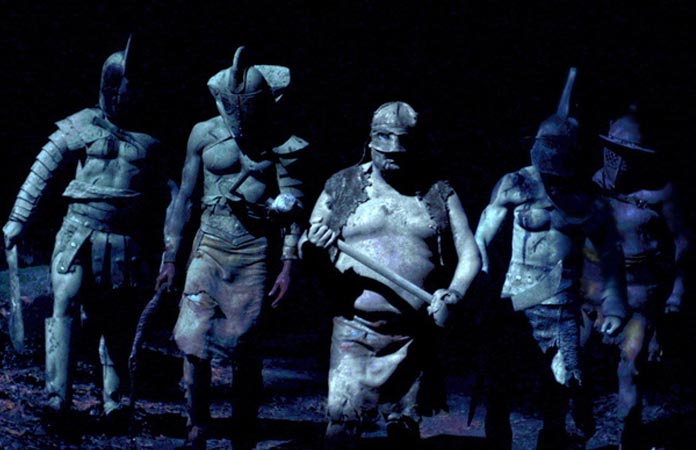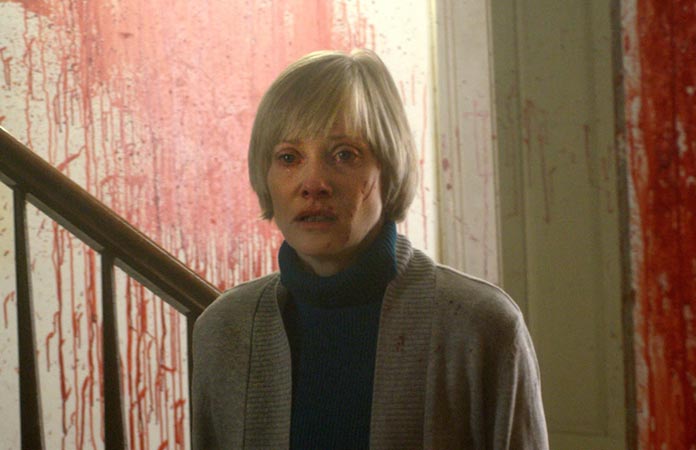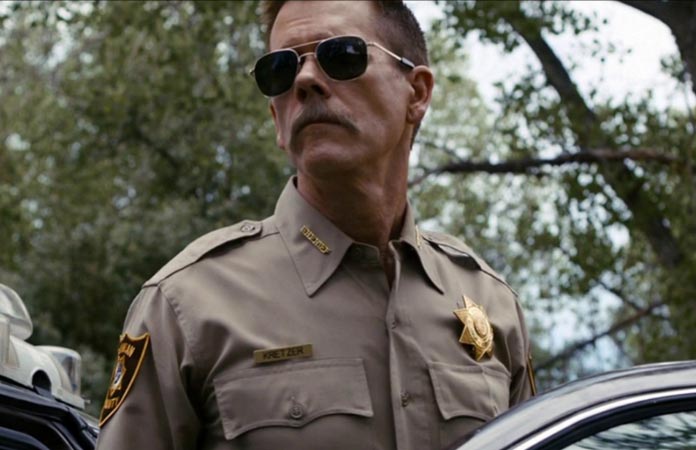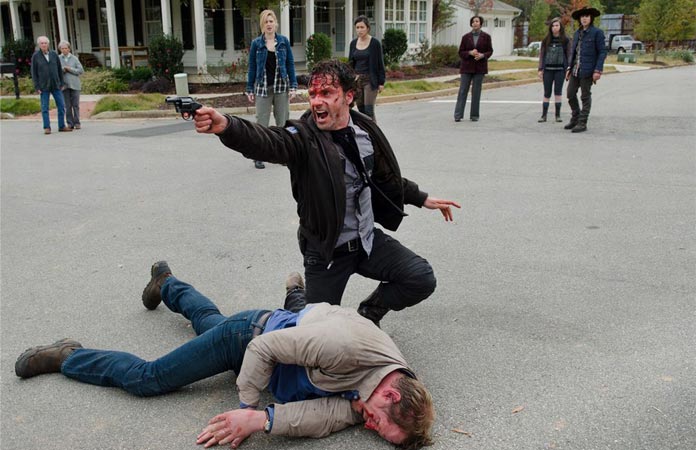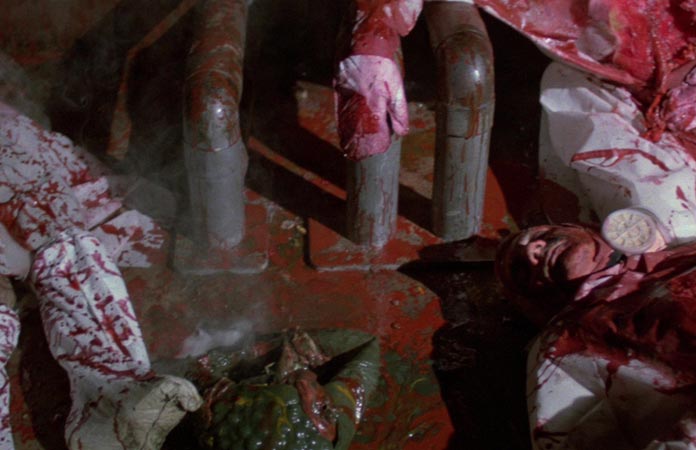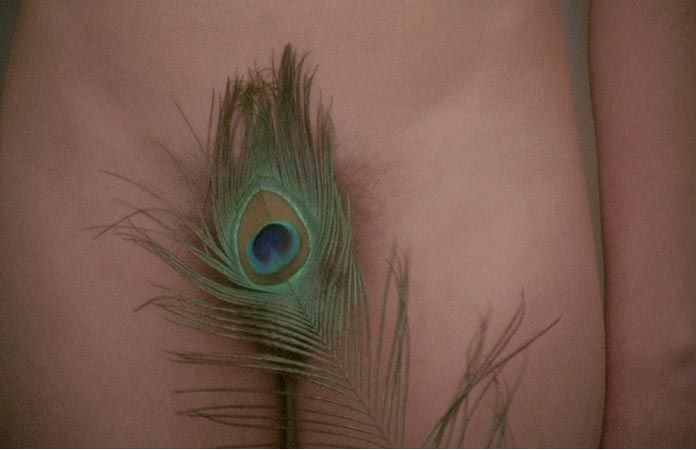Blu-Ray Review, Morituris: Legions Of The Dead
Published on October 15th, 2015 in: Blu-Ray, DVD/Blu-Ray Reviews, Horror, Movie Reviews, Movies, Reviews |TRIGGER WARNING: The following review contains descriptions of sexual abuse, foul language, and general post-film grumpiness.
Blu-Ray Review: We Are Still Here
Published on October 13th, 2015 in: Blu-Ray, DVD/Blu-Ray Reviews, Horror, Movie Reviews, Movies, Reviews |The Sachettis have recently lost their only son Bobby to a car accident and move from the city into an old house in the middle of nowhere, hoping to be able to get past the pain. When the grieving mother Anne tries to explain to her husband Paul that the presence she feels in the house might be the ghost of their son, he scoffs at first, but agrees to let their psychic friends May and Jacob visit in an attempt to put Ann’s mind at ease. As it turns out, the presence in the house isn’t Bobby; it’s something much darker and more malevolent.
This plot seems like it would make for a fantastic movie. Unfortunately, We Are Still Here isn’t that movie. It’s painful to watch such a promising premise go so dreadfully awry.
Blu-Ray Review: Cop Car
Published on October 12th, 2015 in: Blu-Ray, Current Faves, DVD/Blu-Ray Reviews, Movie Reviews, Movies, Reviews |By Brendan Ross
Cop Car is a Colorado-set thriller about two rambunctious young boys who discover an abandoned police cruiser and, with an underdeveloped sense of right from wrong, end up taking it for a joyride. Things get sticky when it turns out sheriff Kevin Bacon was only temporarily parking his cruiser while busy disposing of a corpse in the woods. Upon returning to find that his car was highjacked, Bacon sets out to find the young boys responsible before they check the trunk. Dun dunn dunnnnnn.
Blu-Ray Review: The Walking Dead, Season Five
Published on October 9th, 2015 in: Blu-Ray, Current Faves, DVD/Blu-Ray Reviews, Horror, Reviews, TV |I think it’s safe to say that a lot of people are sick of zombies. And yet, The Walking Dead continues to be one of the most popular shows on television, even producing a spinoff (Fear The Walking Dead) that’s gotten some good buzz. There are those who might be tempted to just give up on the show—and zombies—altogether. Yet The Walking Dead remains one of the most compelling and innovative dramas on television.
Blu-Ray Review: Contamination
Published on October 6th, 2015 in: Blu-Ray, Current Faves, DVD/Blu-Ray Reviews, Horror, Movie Reviews, Movies, Reissues, Retrovirus, Reviews, Science Fiction |When I stated on Facebook that I was watching the 1980 Italian horror-fi movie, Contamination, I got heat from a couple of people.
“Why?”
“How come you’re watching that?”
And I thought, I’ve built a career out of watching horrible films and writing about them. There’s no reason why this should be a surprise.
Then it struck me: maybe there are people out there who don’t intentionally seek out and watch films they know aren’t great. Wow. That floors me. It leaves me wondering how to recommend Contamination, which is a gigantic piece of shit that I adored.
DVD Review: A Plague So Pleasant
Published on September 29th, 2015 in: Current Faves, DVD, DVD/Blu-Ray Reviews, Horror, Movie Reviews, Movies, Reviews |Anyone with a decent camera phone and at least two acquaintances can make a zombie film. It’s that simple. Because of the simplicity of the basic set-up (don’t get eaten), we’ve gotten a lot of zombie flicks that are the same thing over and over. Eat that leg. Yank out those entrails. Cut off those zombie heads and for the love of all that’s profitable, don’t stray from the formula!
The Official Popshifter Podcast, Episode #02: 57 Maidens
Published on September 18th, 2015 in: Blu-Ray, DVD/Blu-Ray Reviews, Music, Music Reviews, Podcasts, Reissues, Retrovirus, Reviews |Welcome to The Official Popshifter Podcast, Episode #02, “57 Maidens and No Wrestling at TIFF”
Featuring Managing Editor Less Lee Moore and Featured Contributor Jeffery X Martin! Enjoy and thanks for listening.
Reviews:
Blu-Ray Review: Immoral Tales
Published on September 15th, 2015 in: Blu-Ray, Culture Shock, Current Faves, DVD/Blu-Ray Reviews, Movie Reviews, Movies, Reissues, Retrovirus, Reviews, Teh Sex |The 1970s were a time of sexual revolution. Women’s liberation, bra-burning, birth control pills, swingers, orgies, and who knows what else? It’s not like people didn’t know about sex before, but in the ’70s, sex exploded (which sounds gross). Suburban couples were lining up around the block to see Deep Throat and Behind the Green Door, two pornographic films that found both mainstream success and legal troubles, as both films were placed on trial for obscenity.
Obscenity still has an elastic meaning, and at times the line between artistic license and simple prurient leanings is blurry and hard to see. That’s precisely where 1974’s Immoral Tales lives, in that strange tesseract on the corner of Softcore Porn and Arthouse Loophole.
DVD Review: The Hee Haw Collection
Published on September 7th, 2015 in: Current Faves, DVD, DVD/Blu-Ray Reviews, Music, Reissues, Retrovirus, Reviews, TV |It would be all too easy to be cynical about Hee Haw, if you were that sort of person. Corny jokes, country music, Buck Owens wearing his overalls backward (he said it was in silent protest of the cheesiness of the show, but he cashed the checks just the same), all the animated dancing pigs (so many animated dancing pigs, kicking in a chorus line through musical performances, sometimes wearing bikinis. The mind simply reels). But to be cynical about Hee Haw would cause you, the viewer, to miss out on a great TV show, indeed a capsule of a moment in time (or several moments, because Hee Haw aired for 21 years).
Blu-Ray Review: Miracle Mile
Published on September 3rd, 2015 in: Blu-Ray, Current Faves, DVD/Blu-Ray Reviews, Movie Reviews, Movies, Reissues, Retrovirus, Reviews |By Brendan Ross
4:00 a.m. A payphone rings outside of an all-night diner in L.A. Our protagonist warily answers it, opening up the line to a frantic missile silo employee lamenting about imminent nuclear destruction set to hit in 70 minutes. Gunshot sounds are heard in the background. A man’s voice takes over the phone.
“Forget everything you’ve just heard and go back to sleep”
This ominously sets the scene for the remaining 70-minute run time of Miracle Mile. The previous 20 minutes, however, set a much different tone.
